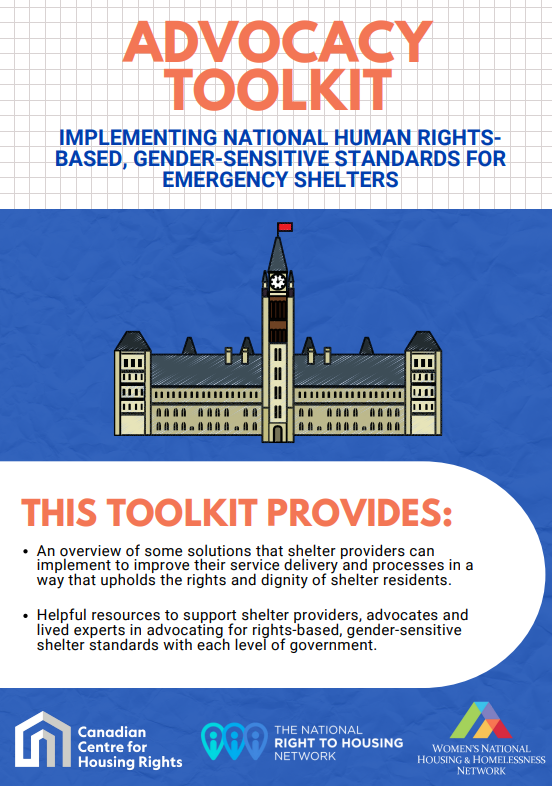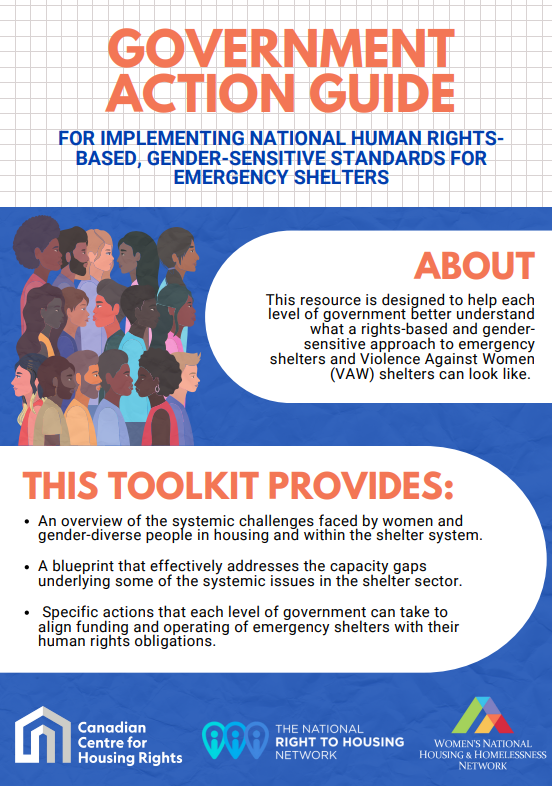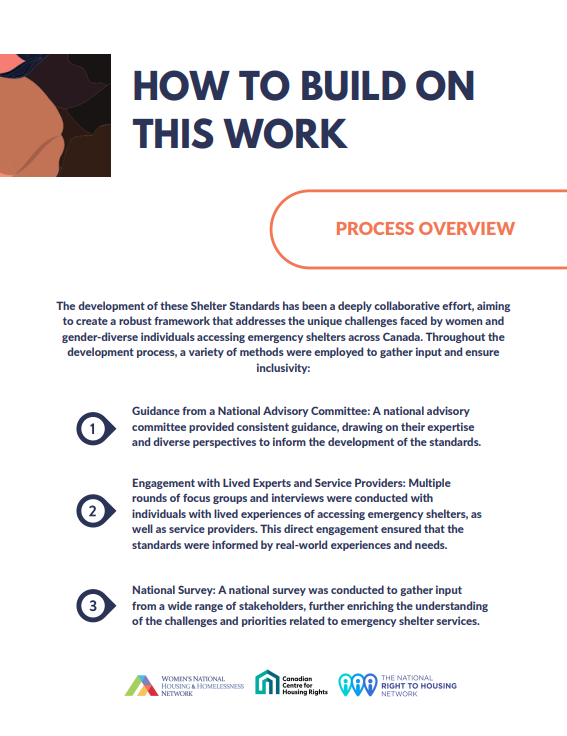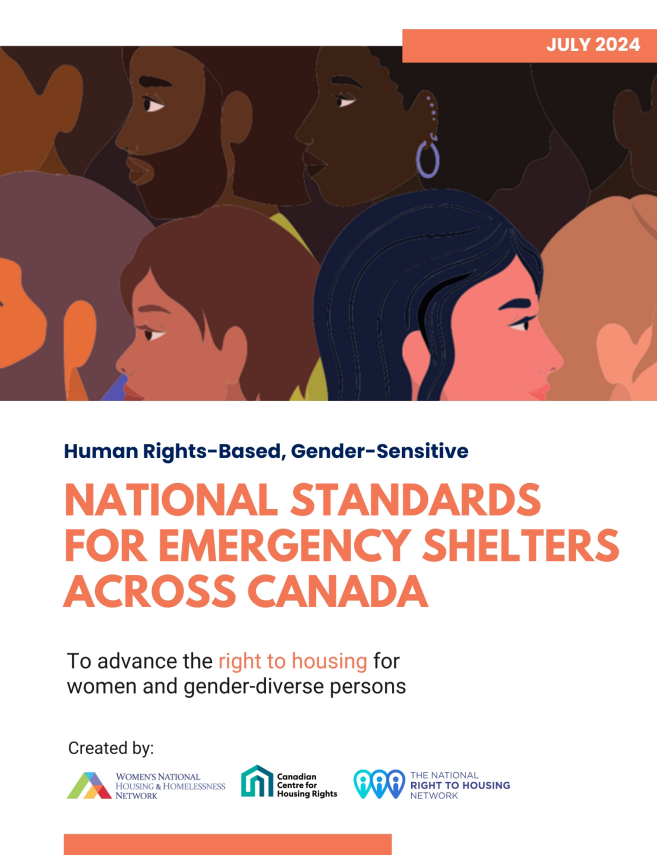How can shelters serve women and gender-diverse people with a rights-based and gender-sensitive approach? That’s the question a new project, funded by the Canada Mortgage and Housing Corporation, has worked to answer by developing new shelter standards that are ready to be adopted across Canada.
For decades, the homelessness-serving sector has taken a one-size-fits-all approach to providing services and emergency shelter to those in need. This approach has led to marginalization of women and gender-diverse people and an invisibilization of their unique experiences. What research we do have on women and gender-diverse people’s homelessness vastly underestimates its scale—and that means they’re undercounted in data, research, and PiT Counts. Given the scarcity of intersectional disaggregated data, women and gender-diverse people are not getting the appropriate services and support they need.
What we do know is grim.
Despite the documented violence and trauma that women and their children face on the streets, each day many are turned away from domestic violence and homelessness shelters due to capacity issues. One in five returns to live with their abuser. About 41% of gender-diverse people report having experiences of discrimination and/or judgment from staff at homeless shelters or drop-ins. This is just a few of the many experiences of homelessness that are unique to women and gender-diverse people.
Meanwhile, emergency shelters – including co-ed shelters, gender-specific shelters, and shelters for women fleeing violence – are frequently overwhelmed and operating beyond their capacity due to chronic underfunding coupled with a deepening housing need across the country.
In an effort to address these issues, the Women’s National Housing and Homelessness Network partnered with the Canadian Centre for Housing Rights and the National Right to Housing Network to deliver national standards that adopt a rights-based and gender-sensitive approach with hopes to improve emergency shelter service and delivery for these under-served populations while also highlighting the essential funding, resources and supports emergency shelters require from governmental bodies.
Today we are releasing, Human Rights-Based, Gender-Sensitive National Standards for Emergency Shelters across Canada. These Standards identify what shelters in Canada could look like if they took a rights-based and gender-sensitive approach. The goal is to transform emergency shelter service delivery for women and gender-diverse people.
The development of these Shelter Standards has been a deeply collaborative effort, aiming to create a robust framework that addresses the complex unique challenges faced by women and gender-diverse individuals accessing emergency shelters across Canada.
At each step of the development process, a diverse range of key actors, including people with lived experiences, service providers, human rights experts, and advocacy groups, were extensively engaged. This inclusive approach ensured that the standards reflected a comprehensive understanding of the genuine needs and dynamic realities faced by those accessing emergency shelters.
These Shelter Standards are grounded in a comprehensive framework that merges international human rights principles with a Gender-Based Analysis Plus (GBA+) approach. By drawing from international treaties, human rights frameworks, and best practices, the standards aim to set a high bar for emergency shelter operations while remaining sensitive to the unique needs of diverse gender identities and expressions.
The Standards aim to:
- Increase access to supports and services for marginalized women and gender-diverse people who are being excluded by these systems;
- Create alternatives to shelter policies and practices that deepen housing precarity for women and gender-diverse persons; and,
- Prevent harm (including intergenerational harm) and rights violations linked to shelter policies and practices related to gender (e.g., transphobia).
Review Panel Submission
These Shelters Standards will also become a joint submission to the upcoming National Housing Council’s review panel. On May 11th, 2023, the Federal Housing Advocate announced the second human rights-based review panel under the National Housing Strategy Act (NHSA) on the Government of Canada’s failure to prevent and eliminate homelessness amongst women and gender-diverse people, particularly those who are Indigenous.
This review panel process will give people with lived experience of gender-based homelessness and housing precarity—as well as civil society allies—an opportunity to share their experiences and solutions and hold the Government accountable in a way that was not possible before.
This will be the second human rights-based review panel conducted in Canada (the first of which is still ongoing on the issue of the financialization of purpose-built rental housing. These review panels are new oversight and human rights-based accountability mechanisms under Canada’s right-to-housing legislation, the National Housing Strategy Act of 2019.
Additional Resources

National Shelter Standards Overview
Read this high-level overview of Human Rights-Based, Gender-Sensitive National Standards for Emergency Shelters across Canada.

Government Relations Advocacy Toolkit
Check out this helpful resource to support shelter providers, advocates and lived experts in advocating for rights-based, gender-sensitive shelter standards with each level of government.

Government Action Guide
This resource is designed to help each level of government better understand what a rights-based and gender-sensitive approach to emergency shelters and Violence Against Women (VAW) shelters can look like. This toolkit provides specific actions that each level of government can take to align funding and operating of emergency shelters with their human rights obligations.

How to Build on This Work Report
This report provides an overview of the team’s process, lessons learned, and key actions to replicate.


